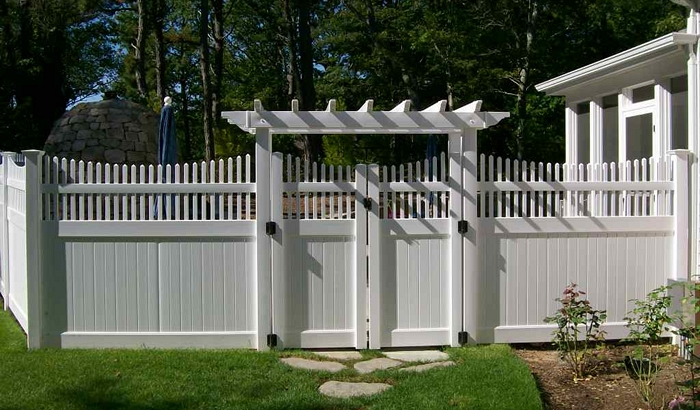Fences are among the most ubiquitous infrastructures on earth, and their impact on wildlife and ecosystems is widespread. Despite this, few researchers have studied fence impacts empirically.
A successful fence requires careful construction. Begin by determining the purpose of your fence and choosing a style. Next, consider the cost. Contact Fence Companies Charlotte now!

Whether you own a fence or share one with neighbors, understanding property boundaries and fence ownership is important for maintaining clear property lines and fostering positive relationships with your neighbors. The law regarding fences and property lines can vary from state to state. In Texas, for example, a fence along a boundary line is considered to belong to both parties unless stated otherwise in legal agreements or documentation.
It’s also a good idea to consult with a professional surveyor for clarity when building a new fence or changing the side-facing of an existing one. A professional can interpret title deeds, land registry plans, and boundary markers to help you determine if your planned fence will infringe on your neighbor’s property. They can also verify your property line for you and mediate disputes when disagreements arise.
In the case of a shared fence, it’s best to communicate openly with your neighbors and be transparent about maintenance responsibilities. Regular upkeep, such as painting, repairing fence panels and removing overgrowth, will show respect for your neighbors’ space and prevent disputes.
Ideally, you and your neighbor will reach a mutually beneficial agreement on the ownership of a shared fence. However, in the event that a dispute does occur, it’s crucial to remain calm and respectful. Discussing the situation calmly can help avoid misunderstandings or even legal action. A neutral mediator may also be helpful in resolving the dispute.
Security
Fencing helps to define and secure a property’s boundaries, making it less attractive to casual trespassers. It can also prevent children and pets from wandering outside the home. Security fencing can be combined with other perimeter protection systems such as lights, cameras, and a manned observation post to improve the effectiveness of the barrier.
Depending on the material and height, security fences can deter thieves by their appearance. Some may be topped with thorny plants to further deter unauthorized entry. Taller fences are generally more effective than shorter ones in deterring unwanted access. Fences with anti-climb features are another option to discourage scaling. Security fences can be reinforced with concrete footings and increased spacing between posts to make it more difficult to gain unauthorized access to a site. They can also be designed to resist vehicle penetration by being crash rated or made with steel reinforcements.
For commercial properties, fences can help to reduce the risk of theft and vandalism by limiting who has access to the property. They can also improve safety and security for employees by creating a physical barrier that makes it more difficult to enter or exit the premises without being noticed.
The type of fence infill, the horizontal rails that give the fence its ‘look’, can also have an impact on security. For example, chain link fence infill is inexpensive and quick to install. However, it is not suitable for high security applications. It is not strong enough to provide the necessary level of intrusion resistance. To ensure that a fence is able to resist intrusion, it should be tested to the ASTM F2781 forced-entry standard or LPS 1175 – both of which require a team of attackers to break through the fence.
Privacy
Whether you’re hosting guests or simply relaxing in your backyard, privacy fences ensure that no one can see what you and your family are up to. This prevents nosey neighbors from eavesdropping and provides a secluded space perfect for entertaining or relaxation.
In addition, a fence can help to reduce noise pollution and block out the sounds of traffic or your neighbor’s conversations that might otherwise disturb your outdoor activities. This is especially important if you have children who are often active in the yard or a pool.
Finally, a fence also protects your home and property from strong winds. This can be particularly helpful if you live in an area prone to frequent storms. It can help to keep debris from blowing away and damaging your landscaping and the façade of your home.
Before you begin construction, check with your local government and homeowner’s association if you have one to find out what your limitations are on height, materials, and other factors that might affect your fence options. Some communities require zoning permits for fences that are taller than six feet, and others may have restrictions on color or style as well.
Wood fences are the most common option for a privacy fence, and they can come in a variety of stains and finishes to complement your yard’s overall look. They’re sturdy and provide a warm, inviting appearance that can work with both traditional and modern homes. For a more contemporary look, consider a vinyl privacy fence that offers a wide range of styles, colors, and customization options.
Aesthetics
A fence plays an important role in a yard’s overall aesthetics. It defines the boundary, often forming the first impression for guests of your home. Hence, it is vital to regularly maintain and clean the fence to ensure its durability and prevent damage. This will help you ensure that the fence is always in its best condition, adding to the overall outdoor aesthetics.
The color and texture of the fence are also major contributors to its aesthetics. For instance, a wooden fence can be stained in light colors to accentuate the wood grain or painted with vibrant hues that add personality to the yard. Similarly, a metal fence can be coated in an oxidation finish to achieve a rustic look or in metallic hues to match the house’s exterior.
Moreover, the height and positioning of the fence plays an important part in dictating the landscape’s visual harmony. For example, a tall wooden picket fence brings a rustic aesthetic to the landscape while offering privacy, while a low garden fence offers a classic charm that welcomes views into a carefully cultivated garden. The compatibility of a fence’s design with the architectural style and character of the house is another essential factor that influences its outdoor aesthetics.
In 2024, the minimalist movement continues to dominate, influencing everything from home décor to fence design. Minimalist fences feature simple patterns and clean lines, which enhance the natural beauty of your yard without overwhelming it. They are also a great option for people who prefer a low-maintenance lifestyle. If you are looking for a modern and eco-friendly option, consider installing a composite fence made of recycled wood and plastic. These fences offer a similar appearance to wood and are durable and cost-efficient.
Ease of Maintenance
A fence that is easy to maintain is a great investment for homeowners. Low-maintenance fences are made from durable materials such as vinyl or aluminum that will require little upkeep over time, as compared to wood fences or other types of metal fencing. These materials resist rust and other damage from weather conditions.
Vinyl fences, for example, are a popular choice among property owners because they are versatile and look great in any setting. They are also very affordable, especially when compared to other types of fencing materials and offer the same look as wood without any of the drawbacks such as rotting or warping.
Another type of low-maintenance fence is chain link fence. This type of fence is very durable, but it does not provide the same privacy as other types of fences. It is not completely cut-proof, and it can be used by intruders to break into a yard or home. It is important to install a chain-link fence with a higher gauge of wire to minimize the risk of an intruder breaking through the mesh.
Regularly cleaning your fence is an excellent way to keep it looking new. Using a hose to spray down the fence and remove any dirt or debris will help it look its best. It is also recommended that you remove any plants or trees growing into the fence. Vines and sucker trees can displace the links in your fence, making them weaker over time.
A fence can be a big project to take on by yourself, but hiring professional installers will ensure your fence is done right and lasts a long time. A professional installer will use high-quality materials and will install the fence quickly and efficiently. They will also ensure that the fence is properly installed and that there are no gaps or other issues that could lead to problems later on.


